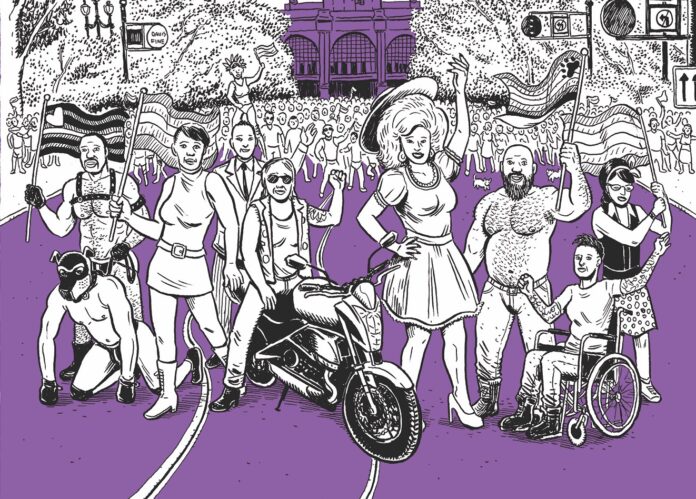“Making public art is extra challenging, but also magical,” cartoonist Justin Hall said of his recent project, “Marching Toward Pride“—which illustrates groundbreaking queer historical moments in the 15 years leading up to and including the first Pride celebration, in 1971, on bus stops down Market Street.
“I have to admit, I enjoyed it when I saw that someone had drawn a big dick over the Tool Box poster,” Hall told me. “It seems like the appropriate response to a story about the opening of the SOMA’s first leather bar!”
Hall’s been a major figure in local queer comics for decades (I just heard him groan at that), bringing a diverse cast of characters from transgender superheroes to forgotten queer figures to life. He himself is a groundbreaker: He basically wrote the textbook on queer comics, the Lambda Award-winning No Straight Lines, and teaches a trailblazing graduate-level queer comics course at CCA. 48hills partnered with his class for Drawing the Crisis in 2015, which illustrated tragic aspects of the housing crisis.
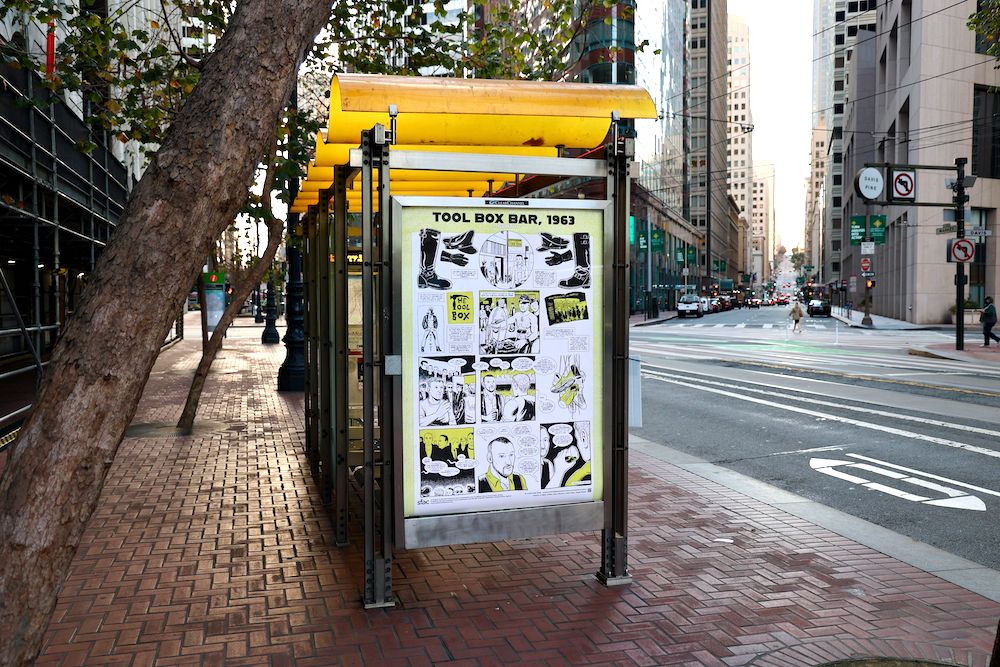
This current project is on a more celebratory note—although it does mark the fact that the 50th anniversary of Pride was unable to explode in its glittery glory last year. (Unicorn hooves are crossed for this year.) It’s always a good time to celebrate our local queer history, however, and Hall’s series of comics is a great stand-in along the parade route echoes the original purpose of the celebration. You get all the queer shine, and none of the Google floats!
Hall’s “Marching Toward Pride” falls on the equally stunning heels of artist Sadie Barnette’s celebration of Black gay nightlife “The New Eagle Creek Saloon Was Here,” artist Win Mixter’s “Pride is a Protest” and photographer Marcela Pardo Ariza’s “Kin-Streets.” The three projects, taken in sequence, embody the fighting spirit of our queer Bay Area family—and provide some employment to our local artists to boot.
Hall’s work focuses on such events as the founding of the first lesbian civil rights organization Daughters of Bilitis, Jose Sarria’s campaign for the Board of Supervisors as the first openly gay candidate for public office in the US, and more. (You can see all of the posters, along with short essays Hall wrote to put them into context, here.)
I spoke to Hall about the challenges of squeezing our dazzling history into all those wee panels, his forthcoming queer comics documentary, and the underground queer comics hero who also helped make Pride possible.
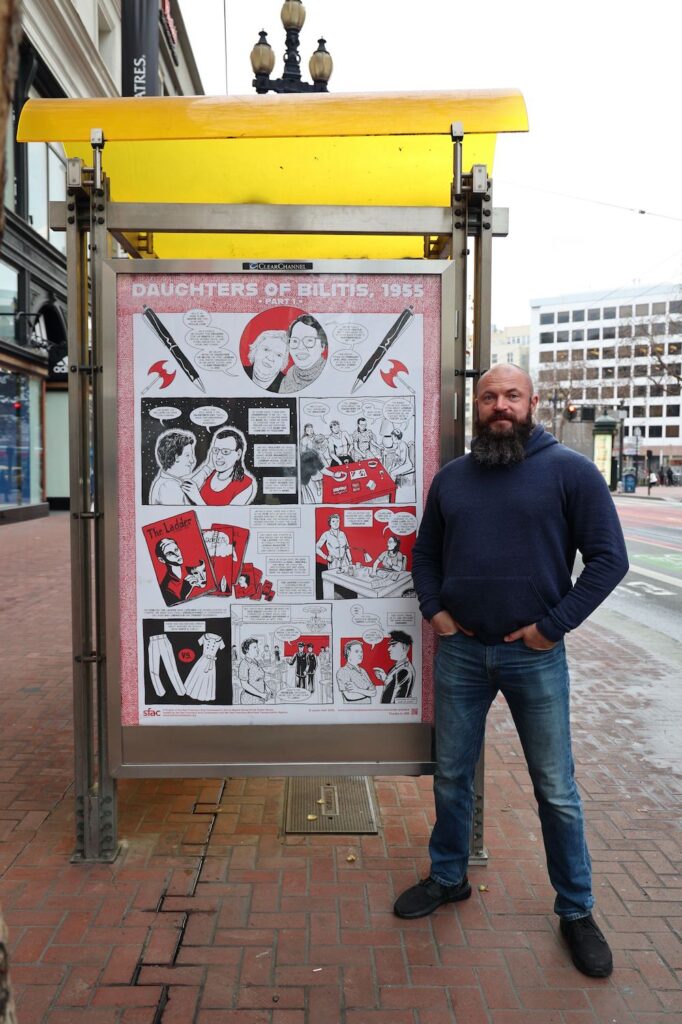
48HILLS What was the genesis of the project, and what led you to illustrate these particular moments in our queer history?
Help us save local journalism!
Every tax-deductible donation helps us grow to cover the issues that mean the most to our community. Become a 48 Hills Hero and support the only daily progressive news source in the Bay Area.
JUSTIN HALL I was one of four artists commissioned by the SF Arts Commission to create posters in the bus stops along Market Street to commemorate the 50th Anniversary of SF Pride in 2020. My posters illustrate six moments in SF LGBTQ history, 1955-1970, leading up to the first Pride. These moments are all told as mono-chromatic comics, with each color representing a color of the rainbow flag. This was a way for me to honor the queer trailblazers of our city, as I don’t ever want us to take them or the work they did for granted.
It would’ve been wonderful to have had the posters up for the crowds that were supposed to descend upon the city last year for all the anniversary gaiety… but the world took another turn. Still, I’m absolutely thrilled that the work was installed and can give folks out on the town something to read and enjoy and also to educate them a bit about our city. Queer history is usually swept under the rug, as it’s generally not taught in families or in school and still carries stigma. It’s our job as artists and storytellers to help correct that.
48HILLS There are obviously some very familiar moments of LGBT history for many of us, but you brought a few to light that aren’t always the center of discussion. What were one or two of the posters that really resonated with you, or taught you something new about local history?
JUSTIN HALL Haha, are you seriously asking me to pick between my babies? I love them all equally! But I have to say, I was especially blown away by how much José Sarria did in his life, and how absolutely fabulous he was while doing all of it. I knew about him before creating the poster about his run for office in 1961 but researching him revealed so many more juicy moments.
It was also such a thrill to connect with Tamara Ching, who was part of the Tenderloin trans and drag scene in the 1960s when the riot at Compton’s Cafeteria erupted, and with Mike Caffee, who was the manager of the Tool Box bar in the beginning days of the SF leather scene. Being able to chat with the folks who lived this history has been incredible
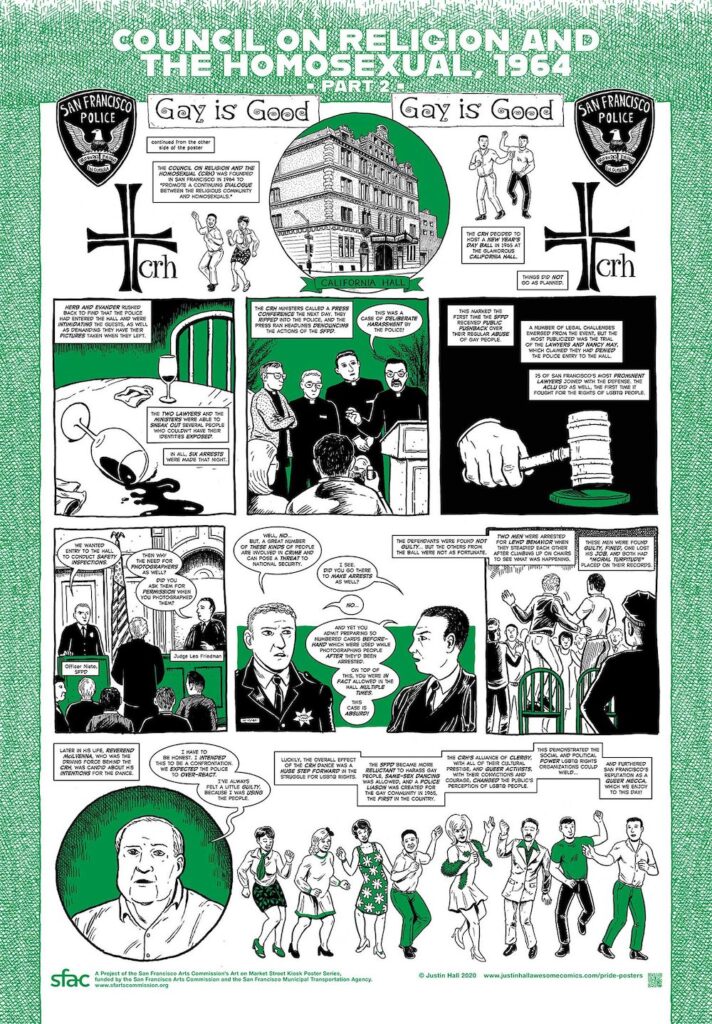
48HILLS I can’t imagine distilling these episodes down into one poster! Did you encounter any particular difficulties in illustrating any of the events or movements?
JUSTIN HALL Making historical comics is a particularly difficult enterprise, I have to say. In prose, you can decide if you want to describe the buttons on a person’s shirt or not, but in comics you have to draw those buttons if you want to draw the person. Which means you have to do that much more research.
In particular, though, the poster I did about the infamous New Year’s Ball of 1965 sponsored by the Council on Religion and the Homosexual presented some challenges. There were a lot of moving parts to the drama, and ultimately I had to streamline my narrative of the events. For example, I depicted several characters arrested at once and thrown into the same paddy wagon by the police. It didn’t happen exactly like that, but I figured that some minor details could be manipulated to make the storytelling work better.
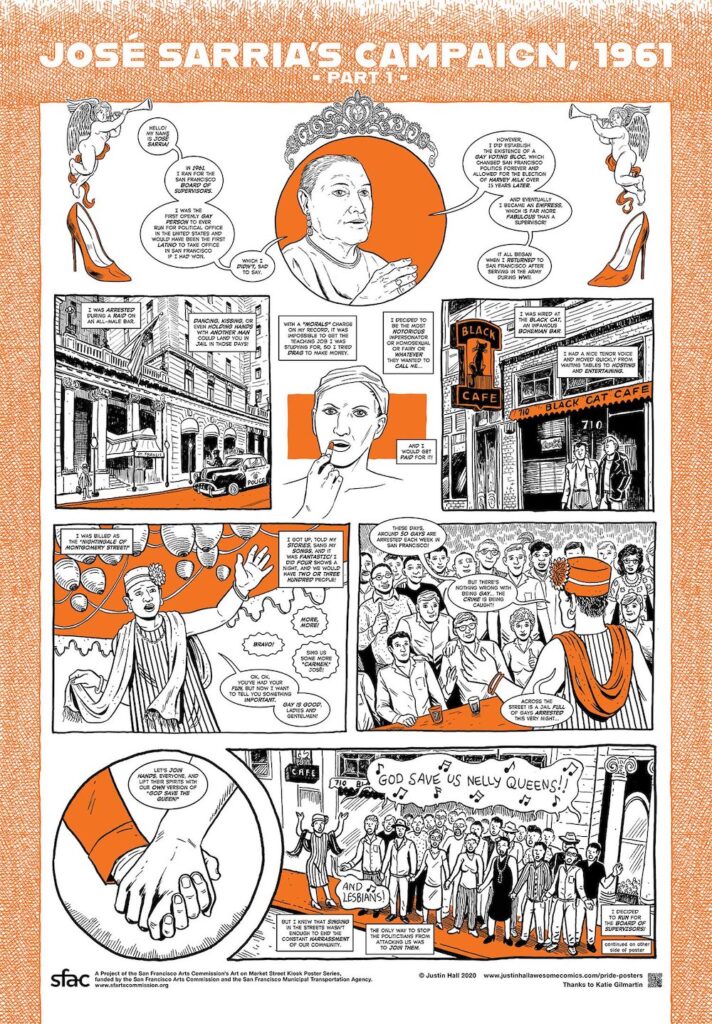
48HILLS You’re working on a documentary about the history of queer comics — any news on that you can share?
JUSTIN HALL Why yes, thanks for asking! We’re just now finishing up a fine cut of No Straight Lines: The Rise of Queer Comics… and it looks AMAZING! I know I’m biased here, but I really do think that director-producer Vivian Kleiman and I have got a great documentary on our hands. We shine a light on five pioneers of LGBTQ comics, and their personal stories are as remarkable as their artistic achievements. The history of queer comics is this unique window into broader LGBTQ culture through the lens of a completely uncensored, DIY artform.
It’s also especially important for us to get this out into the world since the great Howard Cruse, undoubtedly the godfather of queer comics, passed away a little over a year ago. We hope this film will solidify his legacy as one of the finest cartoonists and storytellers of his generation, as well as a truly sweet and genuine man.
Anyone who wants to check out the film should head here… And keep your eyes peeled for streaming and film festival releases hopefully coming soon!
48HILLS What are some of the (zillions of) other projects that have kept you busy during the pandemic?
JUSTIN HALL I’ve been doing a lot of public art recently. I painted a comics mural for the 440 bar in the Castro at the beginning of the pandemic, as well as created art for trashcans in the SOMA Leather Cultural District (which was unfortunately pulled, which you can read about here). I also made a public health comic for Mpact and contributed to a couple of anthologies, as well as continued to plug away on my graphic novel. Finally, my plan is to turn the Market Street posters into a full graphic novel, which I’m really excited about!
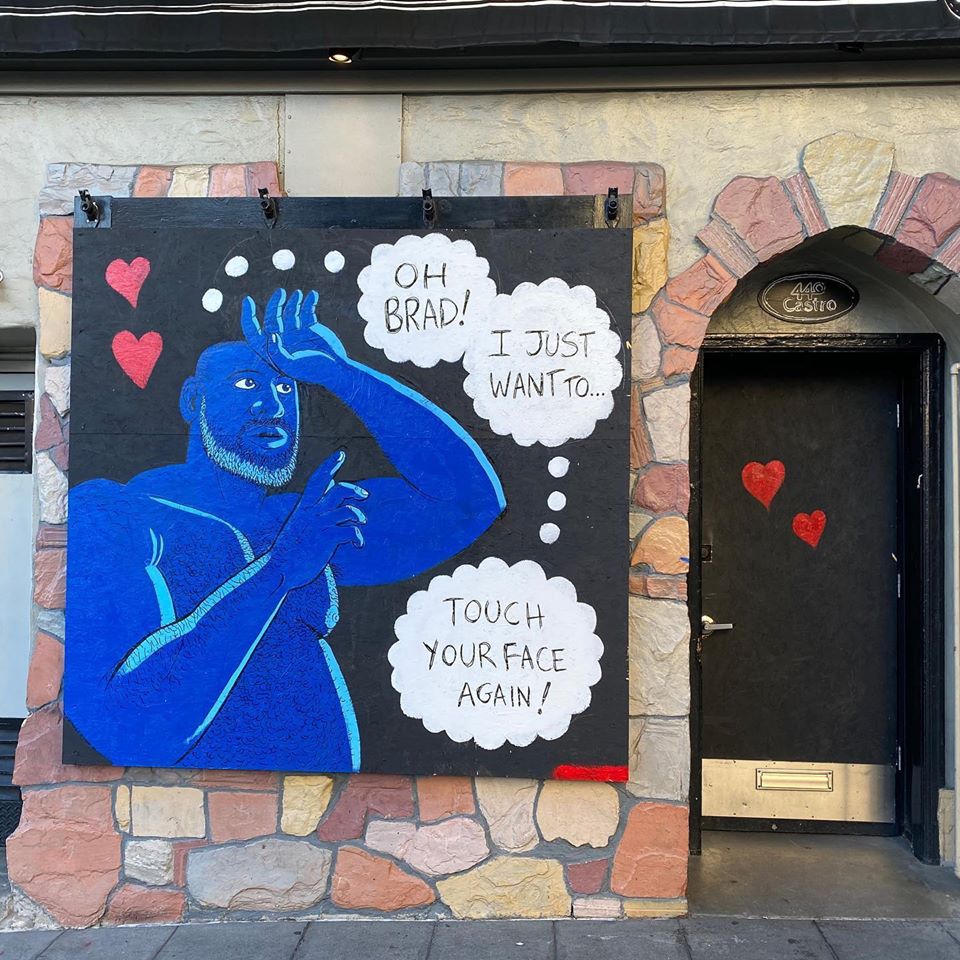
I’m also still teaching in the MFA in Comics program at California College of the Arts. I absolutely love working with students and am so grateful that I get to continue doing that through the pandemic… though I’m still crap at managing Zoom meetings even after all these months! Luckily my students are super-patient with me and my middle-aged brain ☺.


